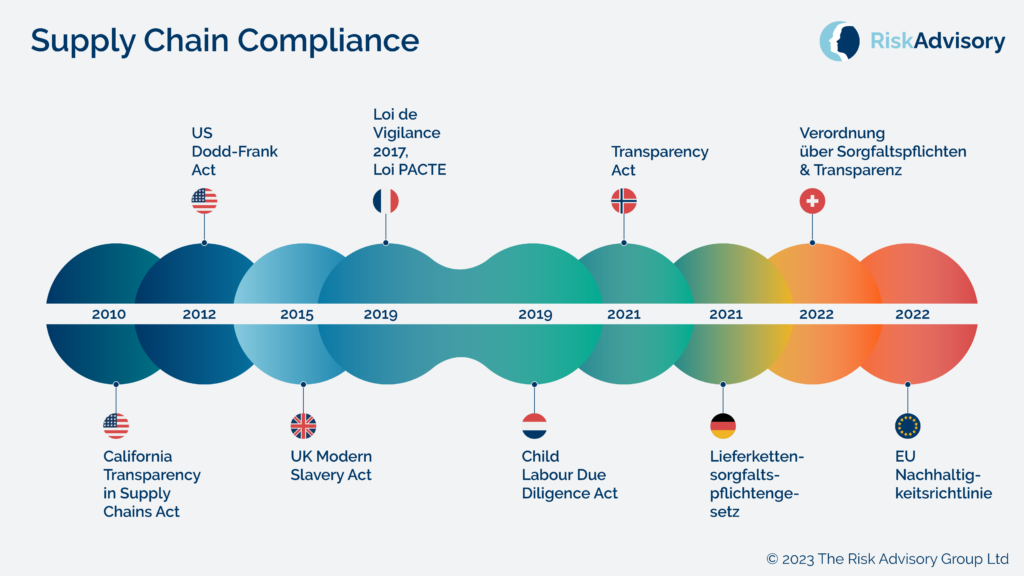News
What the expansion of Germany’s new Supply Chain Act means for your business

A new law in Germany requires companies to conduct supply chain due diligence – and from January next year it will apply to all those with more than 1,000 employees in the country. Medium-sized German companies and significant overseas investors need to prepare now.
The Lieferkettensorgfaltspflichtengesetz (LkSG, or Supply Chain Due Diligence Act) came into effect on 1 January 2023. It places a substantial burden on companies to identify, prevent and address human rights and environmental abuses both in their own operations and in those of their direct suppliers.
The Act applies immediately to companies in Germany, and to German subsidiaries of foreign companies, that have more than 3,000 employees. However, from 1 January 2024 its coverage expands to companies (including subsidiaries of foreign companies) with more than 1,000 employees in Germany. This is a significant expansion given the large number of so-called Mittelstand companies in Germany, as well as the hundreds of multinationals who have significant operations in the country.
The expansion of this law is compounded by several factors that mean business leaders and companies need to start preparing now:
- Many of the businesses that will fall under the law from next year – particularly SMEs – can lack existing in-house compliance capacity or experience of dealing with compliance matters.
- The risks of non-compliance are significant, with fines of up to €800,000, or up to 2% of average annual global turnover. Those penalised also risk exclusion from winning public contracts in Germany for up to three years.
- Reputational damage could be even more severe, as breaches of the Act could lead to bad publicity, critical headlines and consumer boycotts.
What does the Act require?
Companies falling within the scope of the Act must identify and address any environmental, social, and governance (ESG) issues in their supply chains. These include forced labour, child labour, discrimination, violations of freedom of association, unethical employment, unsafe working conditions and environmental degradation.
If companies find violations, they must take action. But critically, they must also proactively set up processes to identify, assess, prevent and remedy risks in their own operations or supply chains, and provide ways for employees of indirect suppliers to file complaints about any human rights or environmental violations.
In practice, this means qualifying companies need dedicated and qualified staff to be responsible for issues such as ESG, human rights and financial crime. However, recruiting and training such people is likely to be challenging, especially in the current environment where supply chains are disrupted and suitably qualified people may be in short supply; it is also very expensive. In addition, many companies will not have the in-house expertise nor experience to manage these issues.
It is therefore well worth considering having a trusted partnership with independent due diligence experts who can supplement the in-house team, and help identify potential issues and develop remedies where necessary. Moreover, this has the added benefit of demonstrating to regulators that a company is taking supply chain issues seriously, mitigating any penalties in the event of non-compliance.
Next steps: preparation and implementation
The Act has been a priority for Chancellor Olaf Scholz’s government. On its publication, Federal Minister for Economic Affairs and Climate Action Robert Habeck said: “Commercial activity has to function in harmony with human rights and it has to be sustainable. The Supply Chain Due Diligence Act plays an important role in this.”
With some 1.4 billion employees worldwide working under inhumane conditions, around 160 million children in work and up to 90% of greenhouse gases and air pollution generated along supply chains, regulation of ESG issues is becoming a priority in many jurisdictions. For example, the United States, United Kingdom, France, The Netherlands, Switzerland and Norway have all introduced laws in the past decade, while the EU is discussing the planned Corporate Sustainability Due Diligence Directive (CSDDD).
This growing web of regulation means that companies must pay close attention to the requirements and thresholds in each country in which they operate. For example, the European Commission proposes that the CSDDD would apply to all businesses with more than 500 employees and turnover of more than €150 million, as well as certain smaller companies – though it would be phased in over three years.
It is crucial for multinational companies to consider what due diligence obligations apply to them, and how to navigate the requirements to ensure the obligations of the new legislation are addressed. The direction of travel is clear, and companies need to prepare now by identifying areas of concern and seeking external advice where appropriate. Doing so will ensure compliance and reduce costs and business disruption in the long term. Ignoring the requirements could lead to significant penalties, damage to reputation and ultimately loss of customers and sales.
To discuss this article or any other ESG/supply chain challenges, please get in touch with one of our experts.
Newsletter signup

Intelligence delivered ingeniously
Helping key decision makers, make the right commercial decisions


